
A lover or a monster: Jeffrey Dahmer in the true crime genre
The Netflix original series Dahmer - Monster: The Jeffrey Dahmer Story premiered on September 21, 2022. The biographical crime drama investigates serial killer Jeffrey Dahmer's motivations and killing techniques. The Dahmer series drew a lot of criticism on social media for its disregard for the relatives of the victims, even though the true crime genre has been popular across all media in recent years. A sister of one of Dahmer's victims spoke with Insider, a global news and lifestyle publication, about how Netflix handled the situation. She stated: “I was never contacted about the show. I feel like Netflix should've asked if we mind or how we felt about making it. They didn't ask me anything. They just did it.” (Vlamis, 2022)
In this article, I will look at the Twitter conversations surrounding the Dahmer series and how they affect the broader conversation about the true crime genre.
True crime: an ethical crime?
The criticism of the show has sparked a larger debate over the morality of the true crime genre. It is one of the most-watched genres on Netflix as of 2022. If you visit the true crime page on Netflix right now, you'll find roughly 40 original shows waiting for you to watch. Netflix has essentially become synonymous with this genre thanks to shows like Into the Deep and The Stranger, as well as the countless documentaries that have recently been released, including Don't F**k With Cats, Catching Killers, Making a Murderer, etc. At the time of the publication of Dahmer - Monster: The Jeffrey Dahmer Story, the series immediately took its position as the top show on the streaming service.
The portrayal of the perpetrator Jeffrey Dahmer caused a trend of romanticization and sensationalization
However, Dahmer has garnered a lot of attention for all the wrong reasons. While some argue that true crime is significant because it allows the viewer to empathize and understand what it was like, the portrayal of the perpetrator Jeffrey Dahmer caused a trend of romanticization and sensationalization. Netflix seemed to have forgotten to include their families in the decisions that were made, while Dahmer - Monster: The Jeffrey Dahmer Story was supposed to be all about the portrayal of the victims.
Ten thousand tweets were all posted on the 27th of September 2022, almost a week after Dahmer – Monster: The Jeffrey Dahmer Story premiered on Netflix. I collected the data through the social data mining platform Netlytic.org, which uses the Twitter REST API v1.1 (Gruzd, 2018). The tweets in this dataset are the ten thousand most recent ones posted at the time of data collection.
To sample the data for this study, I identified a series of popular keywords and hashtags that were used on Twitter in the discussions with the highest engagement about the Dahmer series and the ethics of true crime. These keywords and hashtags included #DahmerNetflix, “Jeffrey Dahmer”, and “true crime”, and also a combination of “true crime” and “Jeffrey” or “Dahmer” within a single tweet.
My research focuses on the discussions that sparked surrounding the series and expanded into the ethics of the true crime genre. Through discourse analysis, I looked at the most influential tweets and the specific discussions that they sparked. I conceptualized such tweets due to their influence derived from engagement, and in this case, retweets and likes were used as a measure of influence: the more times a tweet was retweeted and liked, the more influential it was considered to be.
Re-traumatization
One of the biggest topics in the discussion especially around the Dahmer series is how victims and their families are not being acknowledged by both Netflix and the audience. As mentioned above, Rita Isbell spoke out about her family’s position regarding the series. Another family member posted the tweet in Figure 1.
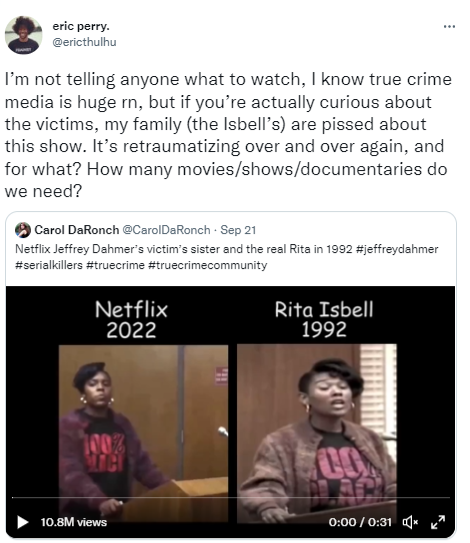
Figure 1: a victim's family member's tweet about Netflix' ignorance of the family
In this tweet, Eric Perry refers to the comparison here made between the actual footage in court during Dahmer’s trial and the recreation from the Netflix series. Besides the fact that the family has not been contacted about the show, seeing these events being recreated and replicated is re-traumatizing for all the victims involved.
However, one popular response to this tweet is one stating the importance of this recreation, saying that “if anything it adds to their humanity and puts real emotion to things others overlooked. It's important for us all to understand the trauma.” The tweet refers to a larger scale outside of the victims’ families, arguing that the public should be able to see this in order to understand how horrifying the situation actually was. The series is argued to be made for providing information.

Figure 2: a tweet arguing against the true crime media on big platforms such as Netflix
Romanticizing the killer
From the re-traumatization, the discussion moved forward and expanded to the true crime genre, as seen in Figure 2.

Figure 2: a tweet arguing against the true crime media on big platforms such as Netflix
While the tweet in Figure 2 is not an actual response to another tweet, it refers to the family’s situation described above while the murderer is being ‘lusted’ over. The romanticization of true crime and the killers involved is another big topic in the discussion surrounding the series and true crime.
Figure 3 gives an example of the way people are sympathizing with Jeffrey Dahmer as a response to the series.
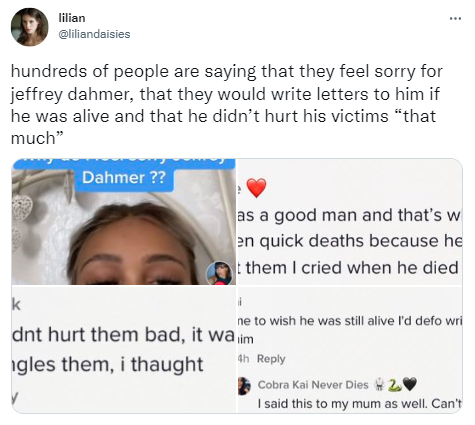
Figure 3: a tweet exposing TikTok comments of people sympathizing with Dahmer
Twitter users have been talking about how people are creating ‘edits’ and ‘thirst traps’ of Jeffrey Dahmer, especially on TikTok. These types of videos are often made to express admiration, love, or lust for the person in the videos.
While Twitter users express their shock at this idolization of serial killers, it is also being said that this is not the first time that people are enacting fandom in crime. Figure 4 shows the previous case of the idolization of Richard Ramirez.
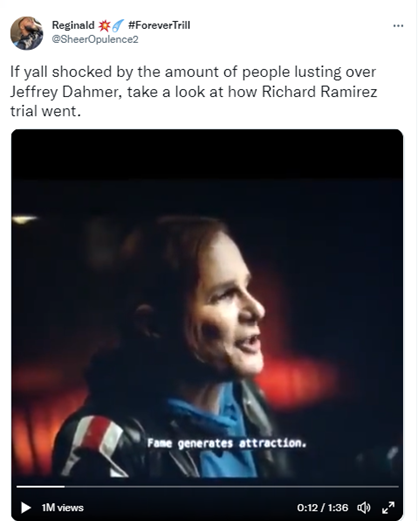
Figure 4: a tweet showing a video of the trial of another serial killer
The video in Figure 4 shows that Richard Ramirez, a man who was convicted of thirteen counts of murder and more crimes in 1989, had groupies who supported him, wrote poems about him, and blamed society for the crimes he committed. People found him attractive and therefore sympathized with him.
While some of the videos now are made of Dahmer himself, most videos are made with visuals of the series, where Dahmer is portrayed by actor Evan Peters, such as in the TikTok exposed in Figure 5.

Figure 5: a tweet reposting a 'romance edit' of Dahmer and one of his victims
As you can read from the tweet above, these videos extend to portray a romance between Evan Peters as Jeffrey Dahmer and one of the victims that is portrayed in the series. This non-existent romance is created through the eyes of the audience of the series.
Fiction vs. Reality
The connection between reality and the Netflix series seems to fade away as people are using the series as their source of entertainment. Twitter users are posting memes for commentary on the series, and other people are actively disconnecting the series from reality as is seen in Figure 6.
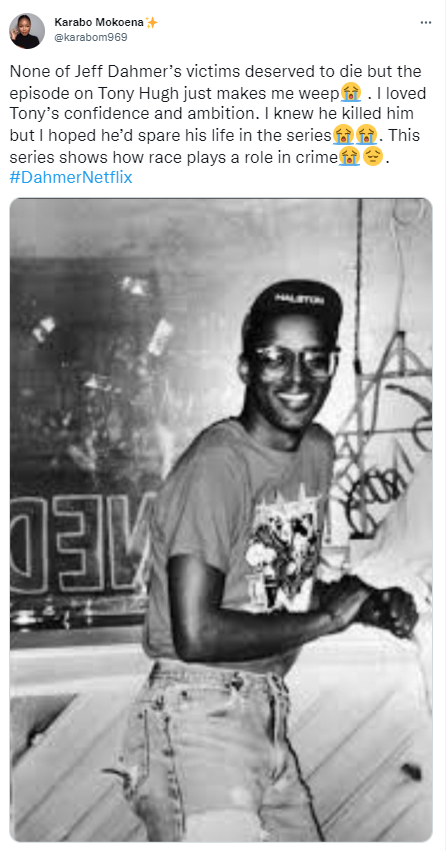
Figure 6: a tweet commenting on the series and the death of Tony Hugh
The comments surrounding the series and other true crime media do not always take reality into consideration
This Twitter user is commenting on one of the series' episodes that shows Tony Hugh's death. The person feels an emotional connection to the situation and “hoped he’d spare his life in the series”, expressing the idea that the biographical crime drama would possibly differ from the reality of the situation. The comments surrounding the series and other true crime media do not always take reality into consideration, and this is for some a larger problem in the true crime genre, as seen in Figure 7 down below.
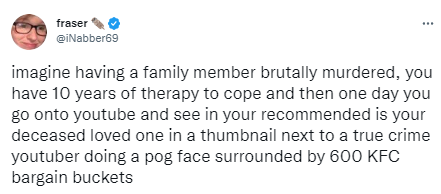
Figure 7: a tweet commenting on how true crime is being treated and consumed online
This Twitter user is ridiculing how some content creators are using true crime cases in their own videos. In this specific example, the user describes YouTube ‘mukbang’ videos, which feature a person eating a large quantity of food while addressing the audience, in this case discussing true crime. Creating these videos seems to go beyond the intention of informing the audience and does again not take the feelings of the family into consideration.
A never-ending discussion
By posting tweets, hashtags, replies, and retweets, Twitter users are able to share information as well as suggest the endorsement of the views of other users. The ease of use together with Twitter’s limit of 290 characters per tweet allows its users to share their thoughts and engage in discussions directly and effortlessly.
The series Dahmer - Monster: The Jeffrey Dahmer Story sparked a discussion on Twitter that went beyond the series itself and extended into a discussion about the consumption, recreation, and usage of true crime. While victims’ families have spoken out about how it is re-traumatizing to see footage being recreated without their permission, others believe that it is the purpose of true crime to inform and create an understanding of what happened. However, this understanding might go further and turn into the romanticization of serial killers. This happens in a form of sympathy for Dahmer himself, but also through the admiration of Evan Peters’ portrayal of the killer. This admiration specified towards the series shows a separation between reality and the Netflix series, which is further shown by how people comment on the events through memes, creating fiction, and commentary styles like mukbang videos.
On the one hand, Netflix occasionally draws attention to stories that assess whether someone has been unfairly condemned (such as documentaries like I Am A Killer and The Confession Tapes). On the other hand, the depictions tend to favor preconceived (and frequently sensationalist) narratives and manipulate public opinion while morality and ethics are neglected, as is the case in Dahmer - Monster: The Jeffrey Dahmer Story.
References
Blommaert, J. (2005). Discourse : a critical introduction (Ser. Key topics in sociolinguistics). Cambridge University Press.